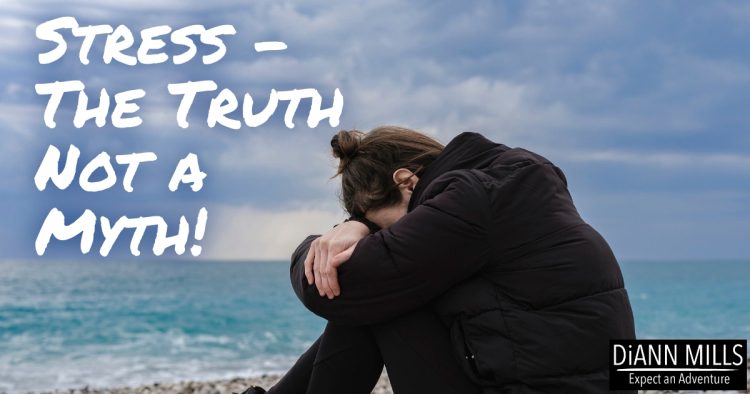By DiAnn Mills @DiAnnMills
Most of us have preconceived ideas about stress. Some of our conclusions are valid, and others are myths. Let’s look at what stress is according to professionals, what stress isn’t, and how we can protect ourselves from debilitating damage to our bodies.
I once believed that stress got blamed for all the medical problems that it supposedly caused. Now I’m convinced unaddressed stressful situations have the potential to destroy us physically and mentally.
With the rise of concerns and statistics about stress, I decided to do a little investigating and share my findings.
Definition
Stress is the body’s normal reaction to tension and strain when adverse situations challenge us.
Truth
Stress can be good for us or damaging to our physical and mental health. Positive stress motivates us to complete a project/task or solve a problem with focus, creativity, and inspiration. We are satisfied with our efforts and achievements. It’s our body’s means of sharpening our minds for short-term projects.
Myth
In an article by Premier Health in 2017, the online publication listed “6 Stress Myths You Might Believe.” I encourage you to read the information. These are explained in the article as:
Myth 1. Stress is the same for everyone.
Myth 2. Stress is always bad for you.
Myth 3. Stress is everywhere—you can’t do anything about it.
Myth 4. The most popular stress-reducing techniques are the best.
Myth 5: No symptoms, no stress.
Myth 6: Only major stress symptoms require attention.
Bad/Chronic Stress
Bad stress occurs when victims view a happening as a physical threat. When situations continue to affect them, chronic stress steps into the picture. Victims suffer from headaches, weakened immune symptoms, heart disease, high blood pressure, insomnia, stroke, overweight, vomiting, diabetes, and more. Mentally we can become depressed, face an inability to focus or concentrate, and/or avoid people and challenging circumstances.
Web MD lists stress as a factor in other medical and mental issues. Worth the read for a better understanding of how our bodies react to potential threats.
What Happens to the Body During Stress?
The Mayo Clinic explains exactly what happens to the body during stress. Hormones rise to aid our adrenaline to eliminate the threat. Although we can work to handle stress appropriately, sometimes our genetics and/or life experiences contribute to our inability to manage unexpected events in our lives.
Solutions
The Mayo Clinic offers “Mayo Mindfulness: Try the 4 A’s for Stress Relief.” The article suggests the following to help cope with undo strain and tension: avoid, alter, accept, or adapt. The article offers sound medical advice with wisdom and insight.
In this article, the Mayo Clinic shares how to handle stress in a healthy manner. The writer offers tips about health, exercise, taking time for ourselves, helping others, and a host of items that we know we should do, but don’t always take the time. Now we have a reason!
Crosswalk offers a variety of articles and resources on Christian living, including topics related to health, wellness, and stress management from a biblical perspective. They provide insights on how faith can guide a person in taking care of their body, which they view as a temple, and in managing stress through prayer, meditation on scripture, and reliance on God’s strength.
Another resource you might find helpful is Focus on the Family. This organization provides numerous resources on Christian living, family life, and emotional well-being, including ways to manage stress and maintain physical and spiritual health through faith.
DiAnn’s tip: Take care of our “temple.” It’s meant to last a lifetime. And use prayer to communicate to God about the stressors and ask Him for the best way to handle them.
If you’d like additional information, search the National Institute of Health, Harvard Health, Science Daily, The American Institute of Stress, and the American Psychological Association.
Do you have a tip that helps relieve stress?



Comments 18
This is exactly the article I needed this week! My family has been under a lot of stress this past week, especially my son. He is seeing a therapist, doing his daily routine of showering, exercising, taking the dog for a walk, cooking himself a nutritious meal and a good night’s sleep if he can. Thankfully he has been talking to God more, as we all have. I like to sit quietly and listen to soothing music while reading a meditation. We all have ways to cope and feel better.
Thanks, Valerie, so glad I could help you. We all have those things in our lives that help, and they aren’t all the same. For me, prayer and Christian music help the most. Be blessed. I just said a prayer for your family.
I need this message today. Thank you DiAnn. Blessings! 🙂
Oh, Melissa, I’m so glad the post was helpful. Blessings to you!
Amen Ms. DiAnn. I’ve experienced both, as everyone has I suspect, and can attest that stress can both help and hurt. I’ve completed projects, met deadlines, and achieved a great many things with positive stressors applied to my life. Often in those same endeavors, I’ve also experienced my fair share of negative stress. I’ve discovered, for me anyway, is that negative stress has a cumulative effect. Years of negative workplace stress (unrealistic deadlines and expectations, pressure to perform, and on and on) resulted in two heart attacks, weight gain, and took an emotional and mental toll on my personal life. Learning to identify and manage stress is key to living a healthy, balanced life.
J.D., Thank you for your transparency. Like you, I’ve experienced negative stress and learned to recognize the symptoms. Some days I simply need to pull myself away from life’s pressures and rest alone in Him. Aren’t we glad our Lord understands us even when we don’t understand ourselves?
Retiring. Well, I haven’t proven that it reduces stress, but I’m going to give it a shot. Will report back in a few months!
Kristine, you will be amazing. My guess is the next time I see you, I’ll be looking into the face of a 29 year old!
THANK YOU for the information. I worked at a very stressful – bad – job for years. Led to panic attacks – I had so much piled on me there was no way I could ever get it done and then the manager made me feel guilty because AI couldn’t get it done. I finally left the job, it took a while for me to get back to “normal.” I still have panic attacks but not as often but I also deal with depression. This spring has been awful. We are leaving on a trip tomorrow that requires flying. I didn’t fly well before Covid and am already feeling the stress.
Sandy, take a deep breath. You can do this and enjoy your trip. Look how far you’ve come. I’m praying for you.
YESSSSSS! This is an excellent perspective on stress. Like most of us, I have experienced both eustress (good stress) and distress (bad stress). As a Licensed Professional Counselor, I have helped many people address stress in their lives. I have mostly specialized in working with children. It saddens me to see the types and amounts of stress they press sent with in counseling sessions. All of the information you have shared is so beneficial and a applicable across the lifespan. Thank you.
Cindy, thank you so much for your kind words. Blessings on your work as a Licensed Professional Counselor.
Recognizing the root of stress can help alleviate this mental enemy. Sometimes we think we can’t do anything about what causes it, but if we investigate what we perceive as hopeless we may find solutions. We also need to distinguish between the stress that helps us and what harms us like you said.
Barbara, thank you for your insight and wisdom.
Excellent information, and your knowledge and research is greatly appreciated. The 4 – A’s are spot on.
My most difficult is accept.
Thank you DiAnn for addressing something most folks don’t care to understand, yet discuss.
Bless you!
Joyce, thank you for your kind words. I struggle with it too, and most certainly the aspect of how to deal with stress.
* Why did you reference an article about 6 myths about stress & only list 4?
* Why did you not include God’s perspective, including scriptural ways to address stress? Your tip about our body being the temple has no grounding since you didn’t cite any Biblical references, as you did with the Msyo Clinic.
* Why did you only include western medicine’s path to dealing with stress when there are many homeopathic & natural ways to relieve stress?
Diann, your article was a good springboard, but not as complete as it could have been. No, every single thought or action ever written about stress could not be included. However, a broader spectrum would have been more thorough and beneficial for your readers.
Bev, thank you for your thoughtful comment and for taking the time to provide feedback on my article. I appreciate your insights and can see how including more perspectives, especially biblical and natural approaches, would have been beneficial.
I apologize for any confusion regarding the reference to ‘6 myths about stress.’ I simply missed including all 6 and have now updated the post.
As for incorporating God’s perspective and scriptural references, your feedback is spot on. I understand how important it is to include a spiritual view, and I updated the post to include a couple of sites that reflect some good resources. I encourage you to share any specific scriptural references you believe could help others and may have resonated with you at some point.
Regarding homeopathic and natural ways to relieve stress, thank you for pointing out this area for expansion. I will consider including more information on these methods in future articles.
Once again, thank you for your feedback. It helps me create better content for readers like you. Please feel free to share any additional thoughts you might have. I look forward to continuing this conversation.
DiAnn